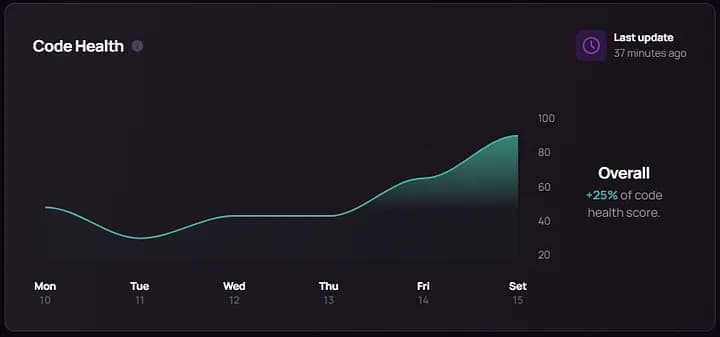How AITR Code Health is Transforming Software Development
In the ever-evolving world of software development, maintaining a high standard of code health is crucial. Whether you’re focusing on code security, architecture, or clean coding practices, ensuring that your codebase is in optimal condition can significantly impact the productivity of developers, ease of onboarding new team members, and overall project stability. With AITR’s Code Health , powered by AI, your development team can now gain deeper insights into the quality of their code, leading to improved efficiency and cleaner, more secure software.
The Importance of Code Health
Code health refers to the overall state of your codebase, which includes aspects like security, maintainability, scalability, and readability. A healthy codebase is easier to understand and maintain, allows new developers to integrate quickly, and ensures that the system can scale as needed without introducing critical errors. On the other hand, an unhealthy codebase is often riddled with technical debt, making it difficult to adapt to new features, leading to higher development costs and potential security vulnerabilities.
AITR’s Code Health provides an AI-powered analysis of your code, evaluating multiple aspects such as security, architecture, clean code principles, and developer adaptability. This continuous evaluation allows teams to identify weak spots early, enabling proactive improvement instead of reactive fixes. Below, we’ll delve deeper into the key benefits this tool offers.
1. Security Enhancements
Security is a top priority in any modern software project. AITR’s AI-based Code Health feature scans your codebase for potential vulnerabilities, providing real-time alerts on issues like exposed APIs, unsafe dependency usage, and insecure coding patterns. Early detection of these problems prevents breaches that could result in lost data or damaged trust, and ensures that your code meets the latest security standards.
By flagging security risks at the code level, AITR helps developers rectify vulnerabilities before they make it to production, reducing the risk of costly security incidents. This feature is particularly useful in today’s fast-paced development cycles, where manual code reviews might overlook subtle security gaps.
2. Clean Code Practices
Maintaining clean code is essential for long-term project success. AITR’s Code Health helps ensure that developers follow clean coding standards by analyzing the code for clarity, modularity, and proper documentation. It highlights areas where the code might be unnecessarily complex or difficult to understand, promoting better practices such as proper variable naming, method length restrictions, and adherence to coding guidelines.
Clean code not only improves maintainability but also fosters a development environment where new team members can quickly get up to speed. By maintaining clarity and simplicity, the codebase becomes more resilient and flexible to future changes.
3. Architectural Integrity
Good architecture is the backbone of any scalable software system. With AITR, developers can ensure that their code adheres to the intended architecture, minimizing the risk of creating spaghetti code or introducing patterns that could harm system performance and scalability. The AI identifies architectural issues such as tight coupling or inappropriate dependencies between modules, providing feedback to maintain the structural integrity of the application.
Over time, adhering to strong architectural principles allows teams to scale their applications efficiently, reducing the risk of bottlenecks and making future development smoother.
4. Onboarding and Developer Adaptability
For growing development teams, onboarding new developers quickly and effectively is a constant challenge. A well-maintained codebase, however, can significantly reduce onboarding time by offering clear, well-structured code that is easy to understand. AITR’s AI analysis evaluates how adaptable the code is for new developers, identifying sections that might cause confusion or require extensive documentation.
This adaptability analysis allows teams to refactor problematic sections of the codebase to ensure that they can continue growing without being slowed down by legacy code or poor documentation. The end result is faster onboarding and improved collaboration across the team.
5. Measuring Code Quality with Data-Driven Insights
AITR doesn’t just flag issues — it provides comprehensive reports on the overall state of your code health. These reports include scores for security, maintainability, architecture, and more, allowing team leads and managers to track improvements over time. These insights make it easier to prioritize areas for improvement and justify investments in technical debt reduction to stakeholders.
Having concrete data on code quality also helps managers make informed decisions about team performance and project timelines, ensuring that quality is maintained without sacrificing speed.

Conclusion
A healthy codebase is foundational to the success of any software project, influencing everything from security to developer productivity. By leveraging AITR’s Code Health, powered by AI, teams can ensure that their code remains secure, clean, and adaptable, leading to smoother project execution and more scalable systems. In a world where agility and quality are paramount, investing in tools that provide continuous feedback on code health is no longer optional — it’s essential.
With AITR, you’re not just improving code — you’re building the future of efficient, secure, and scalable software development.
